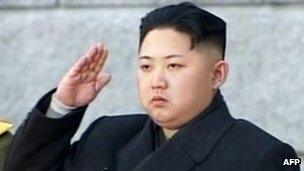North Korea agrees to nuclear moratorium
- Published

The move comes only two months after the succession of Kim Jong-un as leader
North Korea has agreed to suspend uranium enrichment, as well as nuclear and long-range missile tests, following talks with the US.
The US State Department said Pyongyang had also agreed to allow UN inspectors to monitor its reactor in Yongbyon to verify compliance with the measures.
In return, the US is finalising 240,000 tonnes of food aid for the North.
The move comes two months after Kim Jong-un came to power following the death of his father, Kim Jong-il.
Correspondents say the move could pave the way for the resumption of six-party disarmament negotiations with Pyongyang, which last broke down in 2009.
'First step'
US Secretary of State Hillary Clinton said the US still had "profound concerns" over North Korea, but welcomed the move as a "first step".
"On the occasion of Kim Jong-il's death, I said that it is our hope that the new leadership will choose to guide their nation onto the path of peace by living up to its obligations.
"Today's announcement represents a modest first step in the right direction."
North Korea confirmed the move in a foreign ministry statement released in Pyongyang.
The statement, carried by the KCNA news agency, said the measures were "aimed at building confidence for the improvement of relations" between the two countries, and said talks would continue.
"Both the DPRK [North Korea] and the US affirmed that it is in mutual interest to ensure peace and stability on the Korean peninsula, improve the relations between the DPRK and the US, and push ahead with the denuclearisation through dialogue and negotiations," it said.
Yukiya Amano, director general of the UN International Atomic Energy Agency (IAEA), said the announcement was "an important step forward" and that inspectors stood ready to return to North Korea, Reuters reports.
Earlier, a senior US military official said the issue of food aid for North Korea was now linked to political progress - contradicting earlier policy.
The North has suffered persistent food shortages since a famine in the 1990s, and relies on foreign aid to feed its people.
North Korea agreed in 2005 to give up its nuclear ambitions in return for aid and political concessions, as part of a six-nation dialogue process involving the two Koreas, the US, China, Russia and Japan.
But progress on the deal was stop-start, and the agreement broke down in 2009.
Contact between the US and North Korea aimed at restarting the talks began in July 2011.
A meeting last week between US and North Korean officials in Beijing was the third round of talks aimed at exploring how to bring North Korea back to the negotiating table.